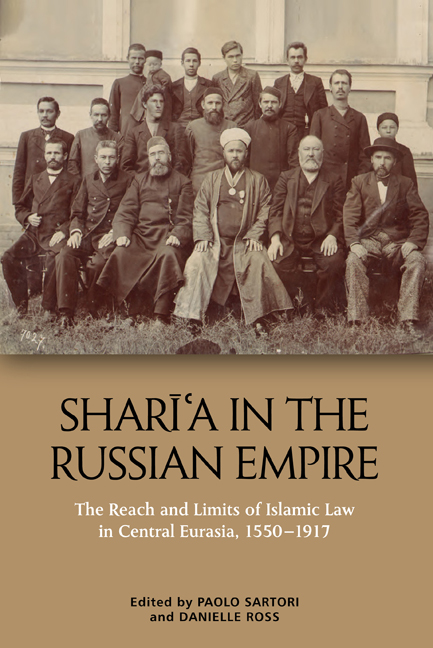Book contents
- Frontmatter
- Contents
- List of Contributors
- Introduction: The Reach and Limits of Sharīʿa in the Russian Empire, c.1552–1917
- 1 Islamic Education for All: Technological Change, Popular Literacy and the Transformation of the Volga-Ural Madrasa, 1650s–1910s
- 2 Taqlīd and Discontinuity: The Transformation of Islamic Legal Authority in the Volga-Ural Region
- 3 Debunking the ‘Unfortunate Girl’ Paradigm: Volga-Ural Muslim Women’s Knowledge Culture and its Transformation across the Long Nineteenth Century
- 4 Between Imperial Law and Islamic Law: Muslim Subjects and the Legality of Remarriage in Nineteenth-century Russia
- 5 Islamic Scholars among the Kereys of Northern Kazakhstan, 1680–1850
- 6 Tinkering with Codification in the Kazakh Steppe: ʿĀdat and Sharīʿa in the Work of Efim Osmolovskii
- 7 Taqlīd and Ijtihād over the Centuries: The Debates on Islamic Legal Theory in Daghestan, 1700s–1920s
- 8 Kunta Ḥājjī and the Stolen Horse
- 9 What We Talk about When We Talk about Taqlīd in Russian Central Asia
- 10 Take Me to Khiva: Sharīʿa as Governance in the Oasis of Khorezm (Nineteenth Century–Early Twentieth)
- Index
3 - Debunking the ‘Unfortunate Girl’ Paradigm: Volga-Ural Muslim Women’s Knowledge Culture and its Transformation across the Long Nineteenth Century
Published online by Cambridge University Press: 22 September 2020
- Frontmatter
- Contents
- List of Contributors
- Introduction: The Reach and Limits of Sharīʿa in the Russian Empire, c.1552–1917
- 1 Islamic Education for All: Technological Change, Popular Literacy and the Transformation of the Volga-Ural Madrasa, 1650s–1910s
- 2 Taqlīd and Discontinuity: The Transformation of Islamic Legal Authority in the Volga-Ural Region
- 3 Debunking the ‘Unfortunate Girl’ Paradigm: Volga-Ural Muslim Women’s Knowledge Culture and its Transformation across the Long Nineteenth Century
- 4 Between Imperial Law and Islamic Law: Muslim Subjects and the Legality of Remarriage in Nineteenth-century Russia
- 5 Islamic Scholars among the Kereys of Northern Kazakhstan, 1680–1850
- 6 Tinkering with Codification in the Kazakh Steppe: ʿĀdat and Sharīʿa in the Work of Efim Osmolovskii
- 7 Taqlīd and Ijtihād over the Centuries: The Debates on Islamic Legal Theory in Daghestan, 1700s–1920s
- 8 Kunta Ḥājjī and the Stolen Horse
- 9 What We Talk about When We Talk about Taqlīd in Russian Central Asia
- 10 Take Me to Khiva: Sharīʿa as Governance in the Oasis of Khorezm (Nineteenth Century–Early Twentieth)
- Index
Summary
Introduction
In ʿAyaḍ al-Isḥāqī's novel, The Hat-making Girl (1902), fifteen-year-old Qamar is seduced by her employer's son. Distressed by her loss of honour, she seeks the advice of an older woman, who counsels her to take up a life of prostitution. Left poor, alone and without work, she eventually leaves the city and wanders the countryside in search of charity. By the end of the novel, she dies during childbirth, her body fatally weakened by starvation and illness.
The journalistic and fictional writings of ʿAyaḍ al-Isḥāqī and other early twentieth-century Tatar social activists have strongly shaped the way that historians think about Muslim women and Muslim cultural, edu¬cational and legal reform in late imperial Russia's Volga-Ural region. These writers’ depictions of Tatar society have been used to support a heroic narrative whereby male reformers strove to improve the lives of Tatar women by promoting women's education, health and rights within the family that supposedly had not previously existed in their society. However, as al-Isḥāqī and other reformist writers used the periodical press and literary realism to forge images of helpless women in a degenerate Muslim society, they passed sweeping, harsh, highly subjective judge-ments on nineteenth-century Muslim women's education and knowl¬edge culture. They ridiculed patterns of knowledge transmission among women and claimed to possess a greater understanding of childrearing, cooking, housekeeping and home medicine than traditionally educated female authorities. Muslim cultural reform of the 1890s to 1910s did not liberate women from an oppressive ‘traditional’ order. Rather, it initiated a struggle for authority over the domestic sphere and a transformation of women's knowledge culture into something more closely resembling Muslim men's educational and intellectual life. Women who wished to take part in reformist circles and to have their views taken seriously by the members of those circles were forced to conform to this new set of cultural and professional practices.
The literature on women penned by reformist writers of the Volga-Ural region in the late 1800s and early 1900s stands at the intersection of discourses on nation and colonialism. In the context of nation-building, female literary characters served as abstract symbols for the emerging nation while new emphases on women's status, health, education and honour were bound up with visions of women as mothers and nurturers of future national citizens.
- Type
- Chapter
- Information
- Shari'a in the Russian EmpireThe Reach and Limits of Islamic Law in Central Eurasia, 1550-1917, pp. 120 - 155Publisher: Edinburgh University PressPrint publication year: 2020



